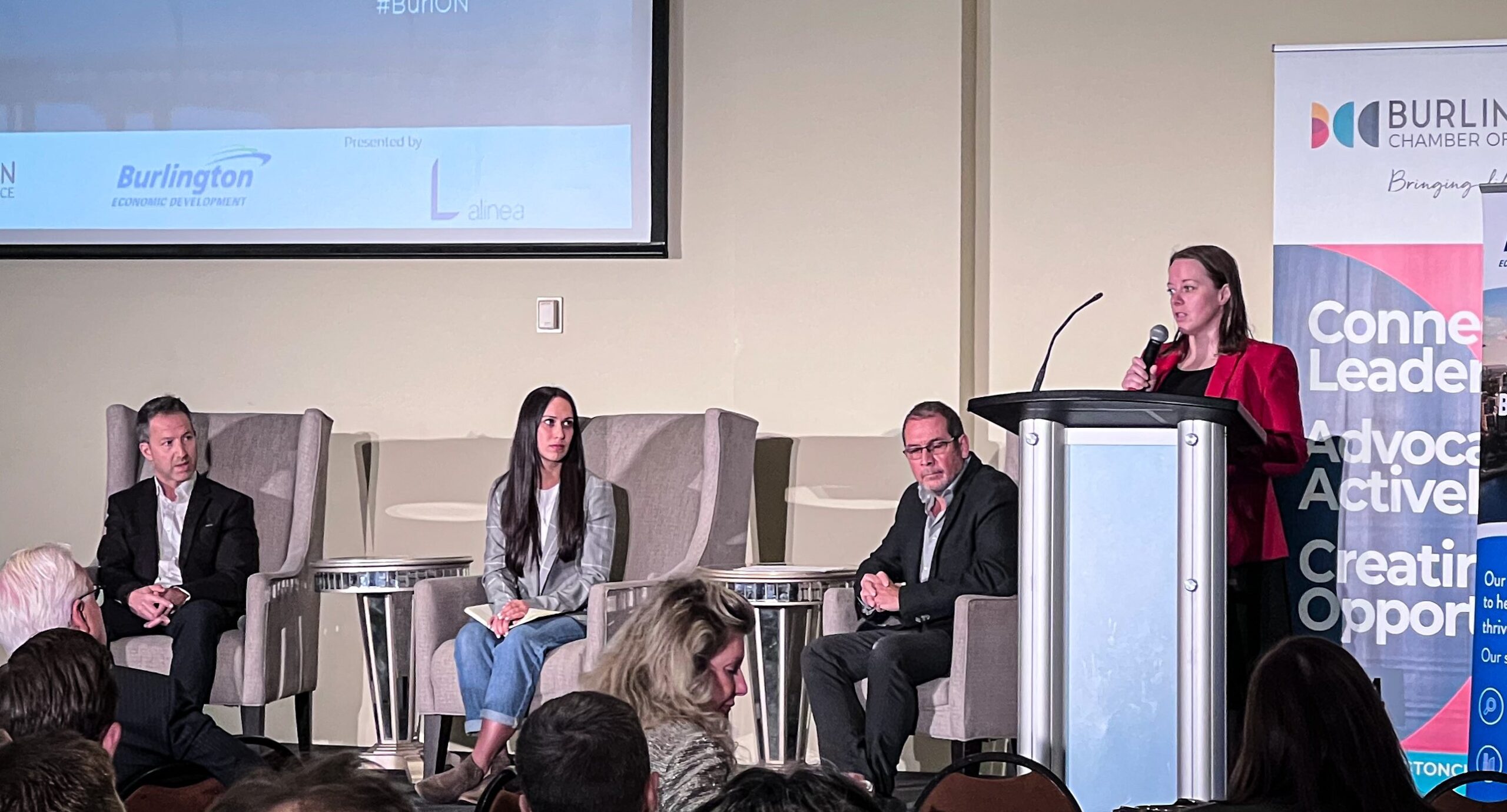By Jack Brittle, Local Journalism Initiative Reporter
On October 25, 2024, the City of Burlington released the Mayor’s Proposed Budget Report.
Outlined in the report were several key additions and changes from last year’s budget, including a tax increase of 5.25%, several major infrastructure and capital projects, and infrastructure and services investments.
Ward 5 Councillor and Deputy Mayor for Strategy and Budgets Paul Sharman said that most of the feedback that he has received from constituents about the budget so far are comments that could apply to any budget that the city puts out and are not specific to any of the individual projects that are outlined in the economic plan for 2025.
“They’re fairly traditional comments and almost irrespective of the budget, it’s the same comments we usually get,” Sharman said. “You know, ‘Well, we don’t really think we should be adding more taxes, but inflation is acceptable.’ Okay, we understand that people don’t like paying more taxes. And yet, the truth of the matter is, our circumstances are that for years and years and years, we were not collecting enough.”
Sharman said that because of some of the targets that the city is not currently meeting, such as on infrastructure, state of good repair, and stabilization reserves, it doesn’t make sense to make “carte-blanche” statements about economic policy such as capping the tax increase at 2.5% to keep up with inflation.
“That doesn’t pay any attention to what’s actually going on in the city and what’s gone before,” Sharman said. “We can’t just magically satisfy everybody all the time, in the moment.”
This is also the second city budget that will be tabled under the province’s strong mayor legislation.
Sharman says that despite the power that Queen’s Park has bestowed upon her, Mayor Marianne Meed Ward still likes to involve the finance department staff in her decisions.
“We want them to actually go through and do their work and inform the choices of the recommendations we make,” Sharman said.
Sharman said that while they are complying with the requirements and scheduling that the province has outlined, they are “actually doing budgeting, with staff and with the support of council, as we would have done anyway.”
Meed Ward elaborated on this process.
“I chose not to present a budget,” Meed Ward said. “I chose to direct staff to present a budget. I gave them further direction around looking at any budget change, increase, decrease or stay the same, through four principles. And that’s what they’ve done and council endorsed that. I’ve tried to be as collaborative as possible with council throughout this, and of course, now we all can amend the budget [council and the mayor].”
Chief Administrative Officer Hassaan Basit echoed Meed Ward’s comments: “It’s a budget that’s empowered staff to bring what they feel the pressures and priorities are.”
The budget is broken down into four separate sections or guidelines: affordability, livability, sustainability, and transparency. Every item in the budget has to relate or adhere to one or more of these ideas.
“In terms of affordability, we’re thinking about how we can help community members who have less resources to be able to take advantage of those facilities [recreation centres, sports fields],” Sharman said.
“But at the same time, we’re not wanting to increase costs to build idle capacity,” Sharman continued. “So, you know, affordability is kind of one of those dual-edged swords.”
Meed Ward brought up some specific policies that relate to affordability such as free transit, seniors’ property tax rebate, and program discounts for lower-income families. When it comes to major capital projects, Sharman mentioned that the city still needs to complete the Robert Bateman Recreation Centre and Skyway Arena; Meed Ward said that both of those facilities will be opening later this year.
“Those are big projects that we’ve been working on for a number of years now, so there’s big money there,” Sharman said. “In addition to that, we have to retrofit parks and equipment in various facilities.
He also spoke about renovating many roads in the city, such as Bromley Rd.
“We actually will be digging up the whole road, and then replacing service pipes, sanitary sewer, water pipes, stormwater pipes, refilling with grading material, and then resurfacing the road,” Sharman said.
When talking about transparency, Meed Ward said that the pre-consultation effort itself is part of that idea.
“We’ve never done that before,” Meed Ward said. “Where before this book was even prepared, going out to the community with a draft of some of our thinking.”
The city has prepared a “budget book,” which condenses the 600-page report into something more digestible for residents.
Sharman spoke about the consultation process.
“We’ve had a very specific objective in the last eight weeks, that is to hold open houses for those who are interested, to come out and talk to us,” Sharman said. “Which was okay. We had some folks turn out, but we don’t get very many from the population of 200,000, 140,000 adults. If we see 40 to 50 people in the course in the course of six meetings, we’re not getting a lot of feedback.”
Sharman gave his interpretation of the low turnout.
“If not a lot of people come out, that would suggest to us that perhaps they think we’re doing a good job, and we know from our annual or biannual community satisfaction surveys that we do, that people are very happy with the services provided by the city,” Sharman said.
Meed Ward said that the free transit initiative has been particularly controversial, but that no issue has unanimous approval.
“I would say that the feedback has been varied on different topics and while some are concerned and want any tax increase to be lower than what is proposed, there are others that understand that they get good value for the money and in fact, are asking for additional service, additional community centres, additional parks, more free transit, and so forth,” Meed Ward said.
Meed Ward said that many residents suggested that if the province or the federal government already has a program in place for something in particular, that the city not invest money to create a program that serves the same purpose.
“That was really good feedback, in terms of where we might trim some things,” Meed Ward said. Meed Ward also said that many ideas that residents came to her with may end up being in consideration for next year’s budget.
The city is also currently not meeting its goal of having 10–15% of its revenues in stabilization reserves; this reserve is sitting at only 7.6%.
“In total, our reserves have never been higher,” Meed Ward said. “There is $291 million overall for committed and uncommitted funding. So the piece that staff have highlighted is just the uncommitted part of the reserves wanting to be higher because it gives you more flexibility if an emergency arises.”
“But we’ve had emergencies, we’ve had Covid, we’ve had flooding,” she continued. “So we’ve drawn those reserves as we should, that’s what they’re there for. And every single year, including in this budget, we invest $11 million back into the reserves. So, we do top them up.”
Basit elaborated on this point.
“Reserves and reserve funds are critical, I think, when used in conjunction with debt policies, they’re a critical component of long-term financial planning,” Basit said. “It provides the city with flexibility to manage debt.”
Basit also clarified that the aforementioned goal is not enshrined in anything but is merely thought to be good practice.
Also mentioned in the budget is an expected population increase in Burlington of 40% over the next 25 years. Meed Ward spoke about one of the ways in which the city is preparing for this influx of residents.
“This budget includes $1 million for our Community Investment Fund, and that is funding set aside in a reserve until it is needed,” Meed Ward said. “But it allows us flexibility. For example, if another school site were to come on the market, we would be in a better position to deploy some of that money to buy it.”
Basit also said that preparing for the increase in population means keeping in mind what things those new citizens will need from the city.
“It’s not just about more people moving in,” Basit said. “The city tries to keep its eye on the changing demographics. Do we need to provide more services for younger families, for kids, for seniors? How is Burlington’s population shifting? What are their needs? What does that mean for the kinds of transit [they need]? So we’re adding a lot of specialized buses to our fleet so they can provide services to seniors and others who may require that.”
“We want the city to be a place where everybody feels that they will be adequately served as they move through the different life stages,” Basit continued.
The proposed budget will be presented to council on November 4 during the Committee of the Whole meeting. Councillors will be able to present motions to modify the budget and the public will still be able to provide feedback as well.
To find out more about the proposed budget, visit https://www.burlington.ca/en/council-and-city-administration/proposed-budget.aspx.





